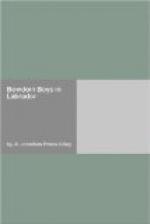The noble little vessel was reluctant to leave any of her freight in so desolate a place, in such frail boats as the Rushtons seemed, and in the calm between the thunder squalls, several times turned towards them, as they energetically pushed up the river’s mouth, and seemed to call them back as she heavily flapped her white sails. They kept steadily on, however, while the Julia, bowing to a power stronger than herself, and to a fresh puff from the rapidly rising thunder heads, speedily reached North West River.
North West River is a sportsman’s paradise. Here we found the only real summer weather of the trip, the thermometer reaching 76 deg. F. on two days in succession, and thunder storms occurring regularly every afternoon. Our gunners and fishermen were tempted off on a long trip. One party planning to be away two or three days, but returning the following morning, reported tracks and sounds of large animals. They said the rain induced them to return so soon.
[Montagnais Indians] Here we found a camp of Montagnais Indians, bringing the winter’s spoils of furs to trade at the post for flour and powder, and the other articles of civilization that they are slowly learning to use. They loaf on their supplies during the summer, hunting only enough to furnish themselves with meat, and then starve during the winter if game happens to be scarce. Measurements were made of some twenty-five of this branch of the Kree tribe, hitherto unknown to anthropometric science, and a full collection of household utensils peculiar to their tribe was procured. Several of the Nascopee tribe were with them, the two inter-marrying freely, and were also measured. The latter are not such magnificent specimens of physical development as the Montagnais, but their tribe is more numerous and seems, if anything, better adapted to thrive in Labrador than their more attractive brothers.
The only remains of their picturesque national costume that we saw, was the cap. The women wore a curious knot of hair, about the size of a small egg, over each ear, while the men wore their hair cut off straight around, a few inches above the shoulders.
In point of personal cleanliness, these people equal any aborigines we have seen, though their camp exhibited that supreme contempt for sanitation that characterizes every village except the Hudson Bay Co.’s posts on the Labrador coast, whether of Indians, Esquimaux or “planters,” as the white and half-breed settlers are called.
Some curious scenes were enacted while the professor was trading for his desired ethnological material. With inexhaustible patience and imperturbable countenance, he sat on a log, surrounded by yelping dogs, and by children and papooses of more or less tender ages and scanty raiment, playing on ten cent harmonicas that had for a time served as a staple of trade, struggling with the dogs and with their equally excited mothers and sisters for a sight of the wonderful basket from whose apparently inexhaustible depths came forth yet more harmonicas, sets of celluloid jewelry, knives, combs, fish-hooks, needles, etc., ad infinitum. The men, whose gravity equalled the delight of the women and children, held themselves somewhat aloof, seldom deigning to enter the circle about the magic basket, and making their trades in a very dignified and careless fashion.




